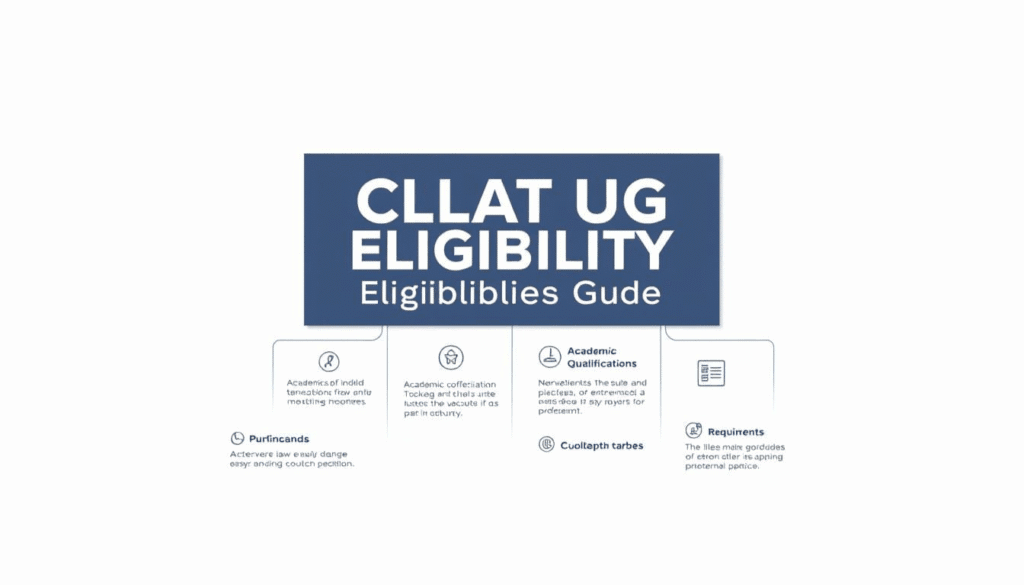Preparing for CLAT 2026 is a challenging path, but you can navigate it with clear planning. Last year, nearly 70,000 students appeared for CLAT 2025, yet only about 5 percent secured a seat at a National Law University. This intense competition makes it essential for you to use every study hour effectively. A tailored self-study plan allows you to tackle your weak areas, build strengths, and manage time wisely. In this guide, you’ll find practical techniques to shape a study regimen that aligns with your learning style. You’ll remain productive, focused, and steadily ready. Lawgic is here to support you throughout. For more information, check out how to create a daily routine for CLAT 2026 preparation.
Navigating the CLAT 2026 exam begins with understanding its structure and the importance of preparation. This article will guide you through the essentials of the exam, focusing on the critical areas that require your attention.
Importance of Exam Preparation
Exam preparation is the foundation for success in CLAT 2026. Effective preparation allows you to become familiar with the exam format and types of questions. It is crucial for building confidence and reducing anxiety on exam day.
Regular study sessions help to reinforce your understanding and improve retention. By focusing on weaker subjects, you can enhance your overall score. According to experts, starting early and maintaining consistency are key strategies.
Incorporating varied study methods, such as group discussions and online courses, can also be beneficial. Engaging with different resources like Lawgic’s budget CLAT prep can provide additional insights.
Key Areas of Focus
Key areas of focus in CLAT include legal reasoning, logical reasoning, and quantitative techniques. Each section tests different skills, so it’s essential to allocate time effectively.
Legal reasoning involves analyzing legal scenarios and applying relevant laws. Resources like Lawgic’s step-by-step approach to legal reasoning can be invaluable.
Logical reasoning requires critical thinking and drawing conclusions from given data. Practicing sample questions regularly can significantly improve your capabilities in this area. Quantitative techniques focus on mathematics and data interpretation.
Changes in CLAT Format
Recent changes in the CLAT format have influenced how students should prepare. Understanding these modifications is crucial for effective study planning.
The exam now emphasizes comprehension and critical analysis. This shift requires a focus on reading skills and understanding complex texts. Videos like this one can help you comprehend these changes better.
Regular updates from CLAT 2026 Study Routine are also recommended. Staying informed about format changes ensures that your preparation is aligned with current standards.
Building a Personalized Study Plan
Crafting a personalized study plan is essential for CLAT 2026 success. This section will help you assess your strengths, set goals, and create a balanced schedule tailored to your needs.
Assessing Your Strengths and Weaknesses
Assessing strengths and weaknesses is the first step in creating a study plan. Identifying areas of improvement allows you to focus your efforts where they are needed most.
One way to assess your skills is through practice tests. These exams can reveal your current standing in various subjects. After identifying weak areas, allocate more time to them in your study plan.
Strengths should not be neglected, however. Regular revision of strong subjects ensures they remain a competitive advantage during the exam.
Setting Realistic Goals and Deadlines
Setting goals with clear deadlines is crucial in maintaining progress and motivation. A structured timeline helps in managing the vast syllabus effectively.
-
Define short-term goals: Focus on daily and weekly objectives to build momentum.
-
Establish long-term goals: Align them with the overall timeline leading up to the exam.
-
Track progress: Regularly evaluate achievements and adjust goals as necessary.
Resources like Vidhigya’s guide can provide valuable insights into goal setting.
Crafting a Balanced Study Schedule
A balanced study schedule ensures all subjects receive adequate attention. This approach prevents burnout and enhances productivity.
Divide your study time among subjects based on their difficulty and your comfort level. Include regular breaks to maintain focus and prevent fatigue.
Consult resources like this timetable guide for sample schedules and tips on maintaining balance. Regular adjustments to your schedule can help accommodate evolving study needs.
Effective Self-Study Techniques
Adopting effective self-study techniques is vital for mastering the CLAT 2026 syllabus. This section will explore strategies for active reading, practice exams, and time management.
Active Reading and Note-Taking
Active reading involves engaging deeply with texts to enhance comprehension and retention. Effective note-taking complements this by capturing key points succinctly.
Underline important sections and write summaries in your own words. This enhances understanding and aids memory. Use mind maps to visualize complex concepts.
Combining these methods with resources like Lawgic’s syllabus understanding can offer a comprehensive approach.
Practice Tests and Mock Exams
Practice tests and mock exams are invaluable in exam preparation. These simulations provide a realistic experience of the test environment.
-
Identify weaknesses: Use results to pinpoint areas needing improvement.
-
Build stamina: Simulate exam conditions to improve focus and endurance.
-
Improve timing: Practice managing time effectively to complete all sections.
Regular practice with diverse question types strengthens your problem-solving skills.
Time Management Strategies
Time management is a critical skill for both preparation and the exam day. Effective strategies ensure you maximize your study sessions and avoid last-minute cramming.
-
Prioritize tasks: Focus on high-impact areas first.
-
Set timers: Allocate specific time blocks to different subjects.
-
Review regularly: Adjust your plan based on progress and challenges.
Incorporating these strategies into your routine leads to more structured and productive study sessions.
Maintaining Motivation and Productivity
Staying motivated and productive throughout your CLAT 2026 preparation is vital. This section provides tips on managing stress, celebrating achievements, and leveraging support from resources like Lawgic.
Dealing with Stress and Burnout
Stress and burnout can severely impact productivity and motivation. Identifying stressors early and employing effective coping mechanisms is crucial.
Engage in relaxation techniques like meditation and exercise. These activities help maintain mental health and reduce anxiety.
Take regular breaks and ensure a balanced lifestyle to prevent burnout. Maintaining a healthy study-life balance is key to long-term success.
Celebrating Small Wins
Celebrating small wins boosts motivation and reinforces positive behavior. Acknowledging progress, no matter how minor, can lead to sustained momentum.
-
Set milestones: Break down larger goals into achievable tasks.
-
Reward yourself: Treat yourself after completing challenging sections.
-
Reflect on progress: Regularly review achievements to build confidence.
Tracking accomplishments can significantly enhance your motivation levels.
Enrolling in Lawgic for Support
Enrolling in Lawgic provides structured support and expert guidance for your CLAT journey. Experienced tutors and tailored coaching programs can enhance your preparation.
Lawgic offers a variety of resources, including online classes, practice materials, and personalized feedback. This comprehensive support system can be instrumental in achieving your goals.
Explore Lawgic’s offerings to supplement your self-study efforts effectively.
On an Ending Note
Successfully preparing for CLAT 2026 entails a well-devised strategy coupled with unwavering dedication. Begin with a thorough understanding of the exam structure, covering its core components and recent changes. Next, craft a personalized study plan that addresses your specific strengths and weaknesses, ensuring a balanced allocation of time across all subjects. This targeted approach not only helps in mastering content but in enhancing your overall test-taking confidence.
Equally crucial is maintaining motivation throughout your preparation journey. Set realistic milestones and celebrate achievements to sustain momentum. Regularly reflecting on your progress can reinforce your dedication, reduce stress and preventing burnout. Moreover, leveraging support systems like Lawgic can be instrumental in your success. Their expert guidance, comprehensive resources, and customized coaching programs offer invaluable insights and boost your self-study efforts. Stay proactive in seeking additional support and continuously adapt your study strategies to align with your evolving needs. With a strong plan in place and the right resources, you are well-equipped to achieve your law aspirations with confidence.
FAQ’s
Q: How early should I start preparing for CLAT 2026?
A: It’s advisable to begin your preparation at least a year in advance to ensure comprehensive coverage of all topics. Early preparation allows ample time for understanding the exam structure, revisiting difficult subjects, and reinforcing your strengths. Additionally, starting early provides flexibility to integrate diverse study methods, undertake consistent revisions, and manage the syllabus workload effectively.
Q: What resources are most helpful for CLAT preparation?
A: A combination of online courses, practice tests, and professional coaching centers like Lawgic can be exceptionally beneficial. Online courses offer the convenience of flexible learning schedules, while practice tests help you understand your progress and readiness by simulating real exam conditions. Coaching centers provide expert guidance, personalized feedback, and structured study plans, enabling you to navigate challenging areas more efficiently.
Q: How can I manage time effectively during the exam?
A: Effective time management can be honed by regularly practicing with timed mock exams, which enhance both speed and accuracy under pressure. Develop a strategy by timing each section to understand where you might spend too much time, and adjust your approach accordingly. Focus on prioritizing tasks that carry more weight or require additional attention. This practice not only builds endurance for the exam day but also boosts your confidence in completing all sections within the allotted time.


